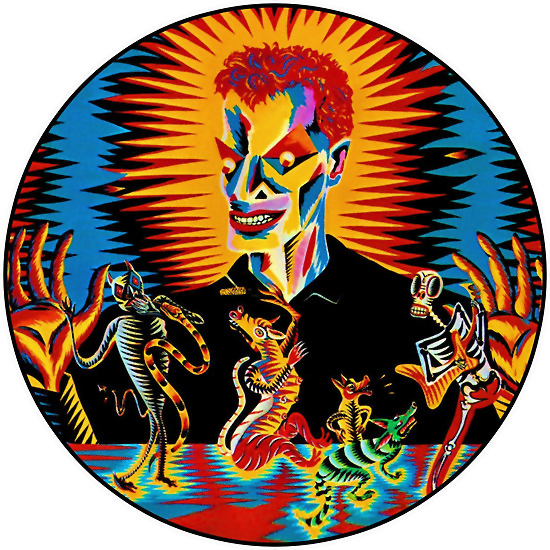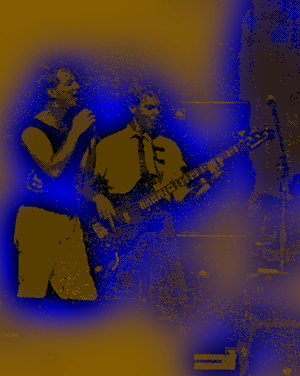
| Search JoyZine with Google Site Search! |
|
Oingo Boingo Interview by Joy Williams
published in Artist Magazine, San Francisco
Currently, 60% of the records on Billboard's Top 100 chart for the U.S. are not by American bands. The sound in rock has been changing and we are experiencing a British Invasion more extensive than the first. Whole shows are put together with nothing but British bands, and this was almost the case with Day on the Green #3 (DOG3), otherwise known as "The Police Show." I say almost because Oingo Boingo was on that show, along with The Thompson Twins, Madness, The Fixx and, of course, The Police. Oingo Boingo put on a good show that sizzling-hot day in late summer, in spite of the fact that their monitors had blown up just before they bounded onstage to a capacity crowd (46,765 ) at the Oakland Coliseum. "The sound was fucked up onstage, but we tried to have a good time anyway," Danny Elfman told me later, backstage. That capacity crowd put "special seating" behind the stage. If you've ever been seated behind the stage, you know that you can only see a little, and the sound is terrible. Nevertheless, I could see Oingo Boingo bounding about, and I could see the audience responding. From my position, I could see instruments being carried off the stage periodically and packed away. Later, in the air-conditioned comfort of their dressing-room trailer, I spoke to Danny. Q: What are those strange instruments with the wooden slats and gourds hanging underneath? Danny: Those are called bolophones. We made them ourselves. It's based on a West African xylophone, called a bolophone. We have a lot of the original ones, but they're delicate; that is, not roadworthy, so we took the design and built our own and put them on wire frames. Then there's the same basic thing with metal, a metalophone. And we have, actually, a whole orchestra of instruments we have built and which we will, at different songs, drag out this one or that. We didn't have them all out today because of the monitor problems eating into our set time. Q: You must be getting used to playing in front of large numbers of people, though. The first time I saw you, or even heard of you, was at the first US Festival (crowd size: 425,000). You weren't really known around here then. Randy: Right. It was just starting right around then. We had kind of a cult following up here at that point, enough to fill a place like the Old Waldorf (capacity: 525). I was surprised so many people were down there [Southern California] from up here [San Francisco Bay Area], because the next time we came up here, all of a sudden we realized our audience had just expanded quite a bit. Q: Now I'm hearing you on the radio quite a bit, especially your single, "Nothing Bad Ever Happens to Me." Is that an expression of your feelings, or the feelings, as you see them, of others? Danny: I'm stressing a point, which is, if something happens in the neighborhood down the way, it could happen next door; if it could happen next door, it's the same as happening right in your living room. It's kind of a universal suburban sickness. A lot of people tend not to be affected by anything until it happens to them. Q: You're a home-town LA band... Danny: (sarcastically) Oh, yeah, REAL home-town LA. All of our success has really come from... When we couldn't get a record deal, couldn't get any recognition, the press hated us down there. Q: The press hated you? Danny: It's a long-standing war we've had with the LA press. Because we've been around a long time and they couldn't "discover" us; we got "discovered" by the kids. The kids made us popular. We started playing a lot, school to school, college to college, and the thing just spread; it was a true grassroots kind of a thing.
Q: After you built up your audience did you come out with an independent? Danny: We did a demo and marketed it, got turned down. I.R.S. picked up the demo and released that demo as our first EP. They didn't have the money to send us back into the studio to re-record it. That was the beginning of '80. They had no West Coast bands at all; we were their first. KROQ [in LA] started playing it, one DJ started pushing us. The requests started coming in real strong. And the only reason we got on the radio is because we got such a good response from the kids. That was the only radio station at the time that was taking requests and tallying them. Q: And you started getting calls from other record companies? Danny: Well, A&M was getting involved with us while we were on I.R.S. We were working with Miles Copeland at the time, who works with Mike Ormly, who is our manager. And Miles came to us -- we only had a one-record deal with I.R,S. -- and said, "We could do it on I.R.S. but we don't have as much as we'd like to give you guys. We'd like you to go to A&M. How much money do you want?" We said, "Oh, a million dollars." He said, "How much money do you need?" We figured out how much money we needed, and we had the deal the next day. Q: How did you develop your sound, which is very distinctive? Danny: There are no real obvious reasons. Each musician in the band has a lot of different influences, which is one of the things that makes us what we are. Q: Yet it blends. How do you work this all out? Is there somebody who has a major influence on what's being done? Danny: Well, I write the tunes but after the tunes are brought... Steve and I work them up into a quasi-arrangement, they go to the band. And from that point on, it's really different on a tune-by-tune basis. Some tunes get completely torn apart and then put back together, 5-10 different ways. And some tunes, we play them the first time and they end up almost identical. Like on this last album, "Nothing Bad Ever Happens to Me" went through quite a bit of working and trying different "feels" and conceptions. "Who Do You Want to Be," the version on the album sounds almost identical to the very first rehearsal tape of that tune. The band hadn't even heard it before. Then there are other tunes that we'll get worked up, we'll try live a couple of times and we won't be happy with a section and we'll rework it. Whenever possible, we work songs out live. Q: Sometimes a band will feel they have a great song but the audience just doesn't respond. What do you do in that case? Danny: When we're trying new material, we try to go on the basis both of initial response and how it feels to us playing it live -- a lot of different things. In other words, whenever we play a brand new number, we know audiences don't particularly respond to things they don't know. They're dancing, they're moving, they're slamming, then suddenly you play a new song and it's not that they don't like it, they just stop and they start listening. We'll see how it felt for us, we'll listen to it on tape, we'll get response from the audiences... We'll do whatever we need to do, or we'll drop it. Q: Are you getting a lot of national exposure now? Danny: It's starting. It's very slow, but it's starting to spread. Trying to make converts. It's hard to say what will happen. The next month or two will reveal a lot. We're just going to tour and plug away and make as many converts as we can. |

